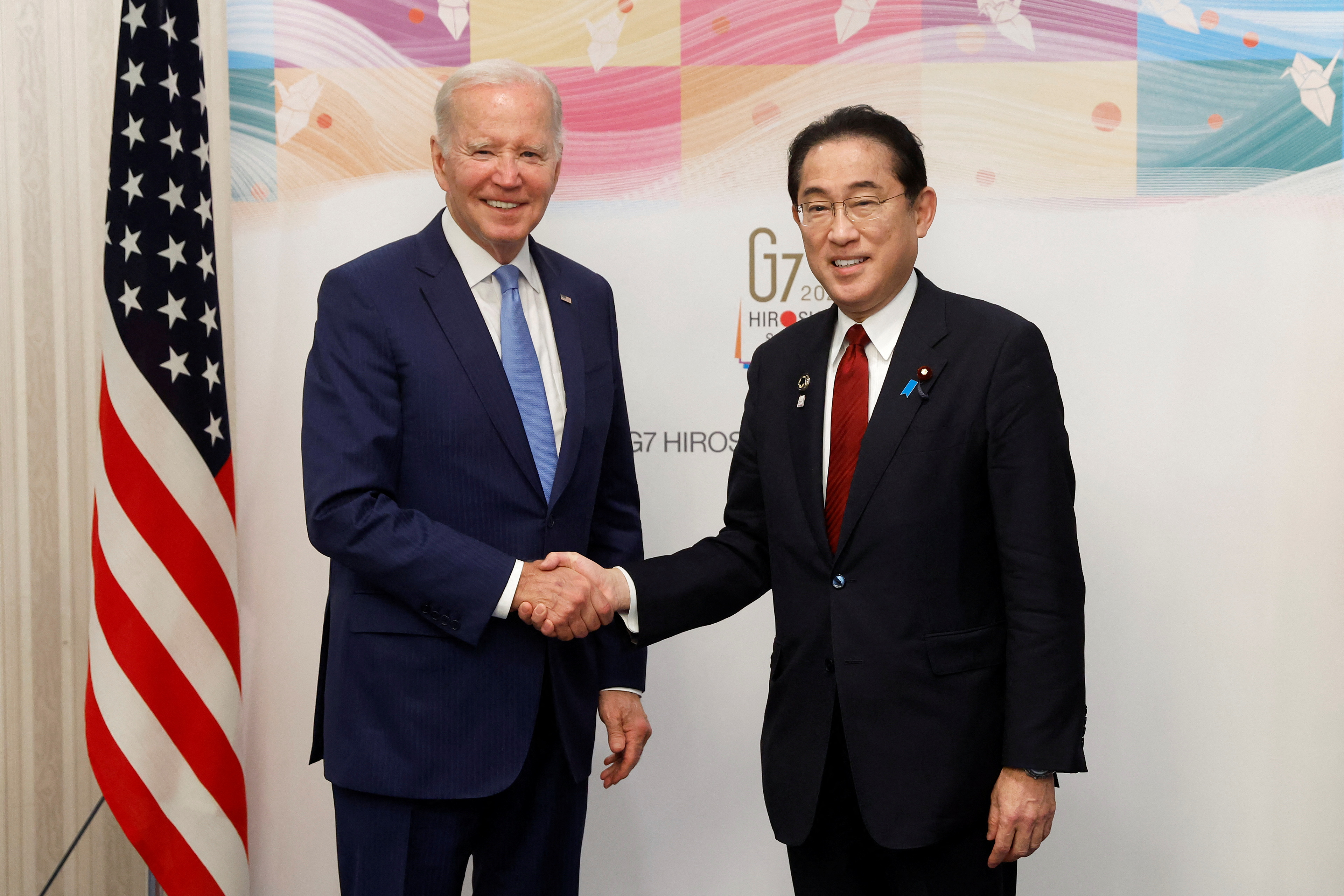TOKYO, May 18 (Reuters) – U.S. President Joe Biden and Japan’s Fumio Kishida met for talks in the deeply symbolic city of Hiroshima on Thursday, aiming for closer cooperation in the face of an ascendant China and an unpredictable Russia they see as threatening the post-war order.
The two met ahead of a three-day Group of Seven (G7) summit that starts on Friday in Hiroshima, the first city to be levelled by an atomic bomb.
Members of the G7, which also includes Germany, the United Kingdom, France, Italy and Canada, are increasingly concerned by what they see as China’s economically coercive policies and its rapid accumulation of sensitive technology – as well as Russia’s repeated threats over use of nuclear arms.
But tackling those issues head-on isn’t so easy, officials from G7 member countries have said in private, particularly given the West’s immense reliance on China, the world’s second-largest economy, as both a trade partner and in some cases a manufacturing base.
“The international community is at a crossroads in history,” Prime Minister Kishida told a briefing following his more than hour-long meeting with Biden.
The summit would be a chance for G7 members to show the world their commitment to “a free and open international order based on the rule of law”, Kishida said, language that appeared to be aimed at both Russia and China.
Japan, although a longtime buyer of Russian oil, has moved in tandem with G7 sanctions against Moscow following Russia’s February 2022 invasion of Ukraine. That military action has also raised fears among Japanese that China could be emboldened to take action against neighbouring, self-ruled Taiwan unless Russia is stopped.
TIGHTEN SANCTIONS

[1/2] U.S. President Joe Biden and Fumio Kishida, Japan’s prime minister, shake hands prior to a bilateral meeting ahead of the Group of Seven (G-7) leaders summit in Hiroshima, Japan, on Thursday, May 18, 2023. Kiyoshi Ota/Pool via REUTERS
The G7 will aim to tighten sanctions on Russia to prevent it skirting measures already in place, Germany’s leader, Olaf Scholz, said on Thursday.
The U.S. will have a package of sanctions associated with a G7 statement that will centre on such an issue of enforcement of Russian sanctions, U.S. National Security Adviser Jake Sullivan told reporters on board Air Force One.
Kishida later said he and Biden had agreed to continue “strict sanctions against Russia as well strong support for Ukraine”.
Ukrainian President Volodymyr Zelenskiy will join one G7 session via teleconference on Sunday, Kishida said. There had been some speculation he might travel to Hiroshima but Kishida said while he was aware of such talk, the schedule “is as announced”.
Kishida and Biden also shared understanding on the importance of protecting strategic technologies, a Japanese government spokesperson said.
Earlier on Thursday, Kishida met with the heads of some of the world’s top chip companies, asking them to invest more in Japan and sending a clear sign of the deepening security importance of advanced technology and supply chains at the G7.
Kishida told the executives, including those from Micron Technology Inc (MU.O), Intel Corp (INTC.O) and Taiwan Semiconductor Manufacturing Co (TSMC) (2330.TW), that stabilising supply chains would be a topic of discussion.
“I am very pleased with your positive attitude towards investment in Japan, and would like the government as a whole to work on further expanding direct investment in Japan and support the semiconductor industry,” Kishida said.
An industry ministry official later said Kishida wanted to foster cooperation to strengthen semiconductor supply chains, while Industry Minister Yasutoshi Nishimura said Japan would use 1.3 trillion yen ($9.63 billion) of the supplementary budget from the last fiscal year to support its chip business.
Reporting by Kantaro Komiya
Editing by Chang-Ran Kim
: .

